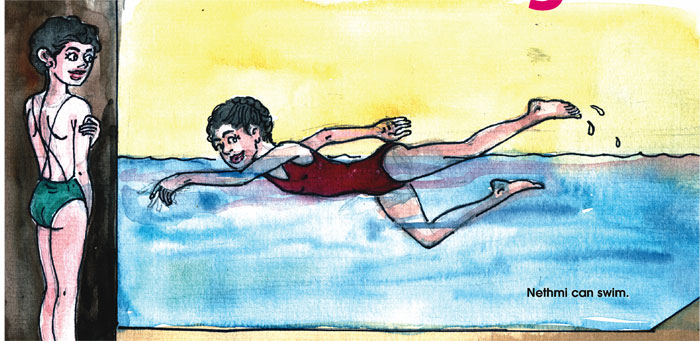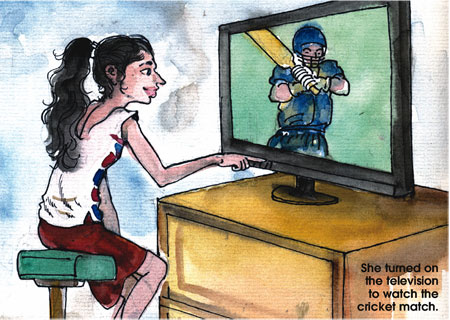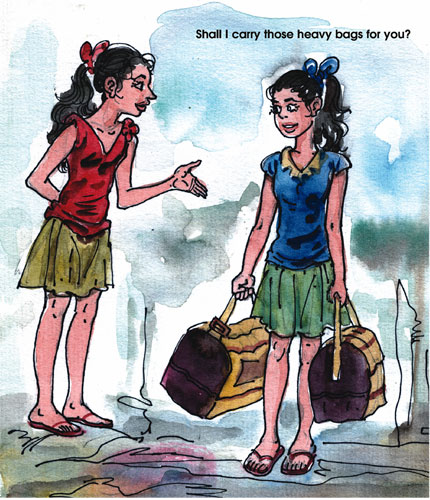|

by R. S. Karunaratne
Infinitives using ‘To’
We usually put ‘to’ with infinitives.
Gemunu wants to go home.
I telephoned Mary to say sorry.
It’s important to drink pure water.
Mother wants to clean the kitchen tomorrow.

Rani wants to buy a laptop.
We use infinitives without ‘to’ after ‘do / does/ did’ in questions.
Do they come from Germany?
Does she speak French?
Did he understand what I said?
Do cats sleep the whole day?
Does Merryl drive his car?
We use infinitives without ‘to’ in negatives.
They don’t understand English.
He doesn’t come from Malaysia.
She doesn’t write to certain newspapers.
I didn’t vote for the XYZ party.
Ravi doesn’t know how to dance.
We use infinitives without ‘to’ after modal verbs such as ‘can,
could, may, might, will, would, shall, should, must’ and ‘had better.’
Nethmi can swim.
Mala could sing when she was young.
You may go home now.
He might come late.
I’ll do it for you.
He would wait for you at the airport.
I shall remember to bring your notebook.
You should cross the road at the pedestrian crossing.
You must send him away.
You had better settle the dispute among yourselves.
We make negative infinitives with ‘not (to) + verb.’
Try not to forget your documents.
I told him not to come here again.
We did not decide to visit our relatives for the New Year.
I took care not to wake the baby up.
You must not smoke in the classroom.
We use an infinitive with ‘to’ to say why we do something.
She turned on the television to watch the cricket match.
Brenda went to France to learn ballet.
Pramudi joined the British Council to learn English.

Children attend school to learn.
He drives a taxi to earn money.
[Activity]
Complete the following sentences with the infinitives of the verbs
given in brackets. Check your answers with the key.
1. Use this button ............... the television. (turn on)
2. Amanda got up early .................. the 6.10 train. (catch)
3. Amila was late to school, so he ............ catch the bus. (run)
4. John wrote to me .............. my results. (know)
5. Emelda sat in the waiting room .................. the doctor. (meet)
6. Kamal has gone to the airport ............ for his son. (wait)
7. Binu is crying .............. her mother’s attention. (draw)
8. Ravi stayed up late last night .............. his homework. (finish)
9. Chandra went to Paris ................ French. (learn)
10. Peter stood up on a chair ............... the top of the cupboard.
(clean)
Key: 1. to turn on 2. to catch 3. ran to 4. to
know 5. to meet 6. to wait 7. to draw 8. to finish 9. to learn 10. to
clean
Match words and meanings
Here’s an exciting way to enrich your vocabulary. Match the words in
Column ‘A’ with the meanings in Column ‘B’ and check your answers with
the key. The first has been done for you.
[Column A]
Y 1. cinematography
... 2. circa
... 3. circuitous
... 4. circulate
... 5. circumnavigate
... 6. circumscribe
... 7. circumspect
... 8. circumstance
... 9. circumvent
... 10. cirrhosis
... 11. cirrus
... 12. cistern
... 13. citadel
... 14. citation
... 15. cite
... 16. civilian
... 17. civility
... 18. clad
... 19. cladding
... 20. clamber
... 21. clamour
... 22. clan
... 23. clandestine
... 24. claptrap
... 25. clarification
--------------------
[Column B]
A. to make a loud complaint
B. protective material covering the surface of something
C. a type of light cloud
D. politeness
E. a strong castle in or near a city
F. to mention something as proof
G. a serious disease of the liver
H. not straight or direct
I. to avoid something cleverly or illegally
J. to move around
K. careful not to take risks
L. approximately
M. to sail all the way around something
N. an explanation
O. silly talk
P. planned or done in secret
Q. a large family sharing the same interest
R. to climb up with difficulty
S. dressed
T. somebody who is not a member of the police or armed forces
U. a word or paragraph taken from a written work
V. a container in which water is stored
W. a fact that makes a situation the way it is
X. to limit something
Y. the art of film photography
--------------------
Key:
2. L 3. H 4. J 5. M 6. X 7. K 8. W 9. I 10. G 11. C 12. V 13. E 14. U
15. F 16. T 17. D 18. S 19. B 20. R 21. A 22. Q 23. P 24. O 25. N
Starters:
More on ‘Will, Would, Shall’ and ‘Should’
Will
We use ‘will’ for a prediction.
Father is doing the night shift today. He will be tired tomorrow.

A team of Australian scientists is trying to find the missing Malaysian
plane. They will succeed.
I'll type all your letters now. It won't take long.
Don't worry. I'll help you to complete your studies.
Jeeva is studying medicine in Australia. She will return to Sri Lanka
next year.
Would
We use ‘would’ for a past prediction or a prediction about a possible
situation.
Sam worked till midnight yesterday. He would be too tired to go to
office today.
A: How about going to Jaffna next weekend?
B: That would be nice.
A: Do you wish to take part in a dancing competition?
B: I wouldn't think of it.
Shall
We use ‘shall’ only after “I’ or ‘we'.
I shall see you tomorrow.
Shall I read the passage?
Shall we go to Sri Pada?
We shall not attend the party.
I shall be 15 in July.
Would like
We use ‘would like’ or its contraction ‘ ‘d like’ to ask for something.
I'd like to meet the principal, please.
We'd like to order lunch for four people.
We also use ‘would like’ in offers and invitations.
Would you like to have coffee?
Would you like to see my library?
We use ‘will’ for a decision or for an offer.
A: Ice cream or fruit-salad?
B: I'll have ice cream, please.
A: I'll wait for at the gate.
B: Oh, it's very nice of you.
We use ‘will not’ or its contraction ‘won't’ for a strong refusal.
“We won't give up the Satyagraha,” said the students.
‘Shall' and `should'
We use ‘shall I ...’ and ‘Shall we ...’ in suggestions.
A: Shall I carry those heavy bags for you?
B: Oh, thanks.
A: Shall we go to that hotel?
B: That's a good idea.
We also use ‘shall’ or ‘should’ to ask for a suggestion.
What shall I do after my O/L exam?
What shall we have for dinner?
What should I do in this situation?
We use ‘should’ to give advice.
You should do regular exercise.
You shouldn't spend all the money you earn.
[Activity]
Fill in the blanks with ‘will, would, won't’ or ‘wouldn't’ and check
your answers with the key.
1. In a few weeks our students days ............. be over.
2. Who knows what the future ........... bring?
3. If we went to the same school, we ............ be together.
4. A: Shall we climb Everest?
B: It ........... be a good idea.
5. I really ........... like to visit Taj Mahal.
6. A: Why don't you eat?
B: I'm on a diet. I ........ eat anything except carrots.
7. We ............. help you to study.
8. A: Why don't you go on a holiday?
B: My boss .............. let me go.
9. I ........... give you a lift to school.
10. A: What's wrong with the washing machine?
B: It .............. open.
--------------------
Key:
1. will 2. will 3. would 4. won't 5. would 6. won't 7. will 8.
wouldn't 9. will 10. wouldn't
--------------------
Quiz on idioms
An idiom is a special kind of phrase. It is a group of words which
have a different meaning when used together from the one it would have
if the meaning of each word were taken individually. Tick the meaning of
the following idioms in bold type and check your answers with the key.
1. If somebody fits the bill ...
(a) he is the right person in a particular situation
(b) he is not the right person for a particular job
(c) he will be able to settle all the bills
2. If you foot the bill ...
(a) you don't have to pay for it
(b) you have to pay for it
(c) you can eat free
3. If you are in a double bind ...
(a) you are in a jubilant mood
(b) you are in a favourable situation
(c) you are in a very difficult situation
4. If the bird has flown ...
(a) the person you expected has disappeared
(b) the bird is missing
(c) you have lost a valuable item
5. If you are a bird of passage ...
(a) you are in a dangerous situation
(b) you are always flying
(c) you never stay in one place for long
6. If you eat like a bird ...
(a) you do not eat very much
(b) you eat a lot
(c) you do not eat at the correct time
7. If you describe two or more people as birds of a feather ...
(a) they are twins
(b) they are very different in many ways
(c) they are very similar in many ways
8. If you say something is for the birds ...
(a) you think it is worth trying
(b) you think it is stupid and boring
(c) you think it is impossible to do
9. If you are champing at the bit ...
(a) you are impatient to do something
(b) you are reluctant to do something
(c) you are always ready to do something
10. If you bite off more than you can chew ...
(a) you are ready to do something at any moment
(b) you are trying to do something difficult to manage
(c) you refuse to do something
Key:
1. (a) 2. (b) 3. (c) 4. (a) 5. (c) 6. (a) 7. (c) 8. (b) 9. (a) 10.
(b) |

